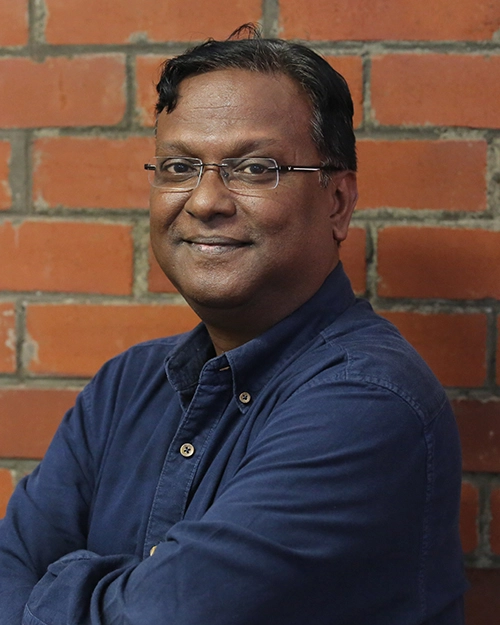
Co-Director, Center for Environment, Sustainability and Human Development (CESH)
Advisory Board, International Academy for Environmental Sanitation and Public Health (IAESPH)
Associate Editor, Humanities and Social Sciences Communication
MS & Ph.D., West Virginia University, USA
Post-Doc, Texas A&M University, USA
Professor and Founder & Co-Director - Center for Environment, Sustainability and Human Development (CESH), JGU
| schaudhuri@jgu.edu.in | |
| Connect with me | |
| ORCID ID | 0000-0002-0380-6128 |
| Key Expertise | Hydrologic Systems' Sustainability, Groundwater Quality Monitoring and Remediation, Air Quality and Health, Spatial Modeling of Environmental Phenomena, Data Analytics in Social Sciences and Natural Resources Management, Environmental Management, Protection and UN Sustainable Development Goals (UN-SDGs) |
Co-Director, Center for Environment, Sustainability and Human Development (CESH)
Advisory Board, International Academy for Environmental Sanitation and Public Health (IAESPH)
Associate Editor, Humanities and Social Sciences Communication
MS & Ph.D., West Virginia University, USA
Post-Doc, Texas A&M University, USA
I am an environmentalist by training, with a background in classical geology. I explore the nature-human connection, by integrating process-level research with geospatial modeling and statistical methods, to aid in smart decision making. My research weaves through emerging environmental issues in the Anthropocene, ranging from water-food security to land degradation to the air quality-health nexus, that threatens the foundations of sustainability and wellbeing, especially in the developing economies.
My research has been published in frontline environmental journals of the world including (please check the ‘Publications’ page for further details):
Global Indices about my research could be found at the links below: ·
As for teaching, my interest lies in (Please check the ‘Courses Taught’ page for further details):
· Spatial Cartographic Mapping and Analysis
STUDENT INTERNSHIPS AVIALABLE (SUMMER & WINTER): A particular aspect of my work is to rightly identify, appreciate and promote student research ideas and have them published in internationally acclaimed journals.
Tentative research areas include the following:
Interested students, please contact at (schaudhuri@jgu.edu.in) with CV and 1-page SOP
Environment and Sustainability Studies
Quantitative Skills II (Statistical Methods)
Global Emerging Environmental Issues in the Anthropocene
Water in Sustainable Development Framework
Data Analyses with MS Excel
Data Processing and Visualization with R for Social Sciences
Geographic Information System (GIS): A Hands-on Primer for Spatial Information Analytics
Basics of MySQL for Database Management and Analysis
Introduction to Python for Exploratory Data Analysis (EDA)
Post-Doctoral Fellow, Texas A&M AgriLife Research Center, Texas A&M University, Texas, USA (2011-2015)
Associate Editor, Humanities and Social Sciences Communications (Nature Series, SCOPUS-enlisted)
Advisory Board, International Academy for Environmental Sanitation and Public Health (IAESPH)
***Parakh, D. and Chaudhuri, S. 2023. Groundwater Markets in South Asia: A Bibliometric Assessment of Challenges and Opportunities for Sustainable Irrigation Development. Journal of South Asian Development. 18(2):265-294. DOI: 10.1177/09731741231151298 https://journals.sagepub.com/eprint/XUEPCM2DXSKDJBCWG7NQ/full
***Kumar, A. and Chaudhuri, S. 2022. Improving Urban Air Quality Monitoring in New Delhi, India: Reflections on Low-Cost Air Quality Sensors (LCAQS) and Participatory Engagement. Environment and Urbanization Asia. 13(2):265-283. https://journals.sagepub.com/doi/abs/10.1177/09754253221122752?journalCode=euaa
*Adithyalakshmanan, K. **Kaur, H., and Chaudhuri, S. 2022. Unpacking Land Degradation Neutrality (LDN), An Emerging Paradigm to Conserve Land Systems’ Sustainability in the 21st Century? Meta-analysis of Challenges and Opportunities. Nature, Environment and Pollution Technology. 21(1):91-100. https://agris.fao.org/agris-search/search.do?recordID=IN2022500007
***Parakh, D. and S. Chaudhuri. 2022. Groundwater Regulation Bills in Haryana – A Call for Groundwater Conservation and Management for Sustainable Irrigation Supply Services – Opportunities and Challenges. Ecology, Environment and Conservation. 28(1):147-164. http://www.envirobiotechjournals.com/article_abstract.php?aid=12342&iid=348&jid=3
‡Ankita, Patvednaya, V., Chaudhuri, S. 2022. What do Farmers Don’t Know? A Generic Index to Summarize Cognitive Awareness of Groundwater sourced Irrigation and Conservation at Grassroots. Ecology, Environment and Conservation. 28(1):179-192. http://www.envirobiotechjournals.com/article_abstract.php?aid=12345&iid=348&jid=3
***Kumar, A. and Chaudhuri, S. 2022. Post SARS-CoV-2 Urban India: Computing Air Quality Health Indicators (AQHI) for Gurugram City to Assess Imminent Threats to Public Health. Ecology, Environment and Conservation. 28:S185-S193. http://www.envirobiotechjournals.com/article_abstract.php?aid=12140&iid=345&jid=3
***Kumar, A. and Chaudhuri, S. 2021. Is COVID-19 Only but a Short-term Respite? A Case Study of Urban Air Quality in Kolkata, A Mega-city in India. Pollution Research. 40:S162-S172. http://www.envirobiotechjournals.com/article_abstract.php?aid=11409&iid=330&jid=4
*Former student researcher at CESH, currently pursuing MS on Environmental Management in University of Bristol
**Former student researcher at CESH, currently pursuing MS in on Water Science & Policy in Oxford University
*** Graduate Research and Immersion Program (GRIP) Research Fellows; Senior Fellows, CESH
‡Post-graduate student researcher (Jindal School of Global Policy, Senior Fellow, CESH))
“Groundwater nitrate concentrations increasing in Rolling Plains” – Story by Kay Ledbetter, June 12, 2012 http://today.agrilife.org/2012/06/12/agrilife-research-groundwater-nitrate-concentrations-increasing-in-rolling-plains/
http://southwestfarmpress.com/irrigation/agrilife-research-groundwater-nitrate-concentrations-increasing-rolling-plains http://www.winklerpost.com/postnews/2012/wp20120614/wp20120614_pet3.php
“Texoma Nitrate Levels Increasing”. – NewsChannel6, July 6, 2012. http://www.newschannel6now.com/story/18969039/nitrate-levels-increasing
“Groundwater Nitrates in the Seymour Aquifer: Problem or Resource?” – Story by: Alejandra Arreola-Traina, tx H2O, Fall 2012. http://twri.tamu.edu/publications/txh2o/fall-2012/groundwater-nitrates-in-seymour-aquifer-problem-or-resource/
BioNews Texas, April 11, 2013 http://bionews-tx.com/news/2013/04/11/texas-am-agrilife-researchers-identify-serious-concerns-about-future-of-dallasfort-worth-metroplex-water-supply/
Dallas Morning News, May 13, 2013: http://www.dallasnews.com/news/metro/20130413-study-raises-concerns-about-dallas-fort-worth-groundwater-levels-quality.ece
“Salinization of groundwater resources in Texas is a growing concern”. – Story by Kay Ledbetter, November 15, 2013. http://today.agrilife.org/2013/11/15/agrilife-research-study-salinization-of-groundwater-resources-in-texas-is-a-growing-concern/
Water well Journal – A publication of the National Groundwater Association, November 25, 2013. http://waterwelljournal.org/?p=5949
“Distinct geographical patterns in Texas’ Ogallala aquifer water quality: Southern region has a growing concern.” – Story by Kay Ledbetter, March 20, 2014. https://today.agrilife.org/2014/03/20/agrilife-research-study-distinct-geographical-pattern-in-texas-ogallala-aquifer-water-quality/
“Texas’ Ogallala aquifer water quality in question” – The Weekly Livestock Reporter. March 27, 2014. http://www.weeklylivestock.com/stories.html
"AgriLife Research study identifies contributing factors to groundwater table declines" - AgriLife Today, July 10, 2014 http://today.agrilife.org/2014/07/10/agrilife-research-study-identifies-contributing-factors-to-groundwater-table-declines/
| schaudhuri@jgu.edu.in | |
| ORCID ID | 0000-0002-0380-6128 |
| Key Expertise | Hydrologic Systems' Sustainability, Groundwater Quality Monitoring and Remediation, Air Quality and Health, Spatial Modeling of Environmental Phenomena, Data Analytics in Social Sciences and Natural Resources Management, Environmental Management, Protection and UN Sustainable Development Goals (UN-SDGs) |